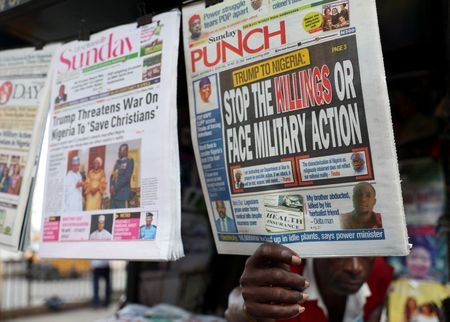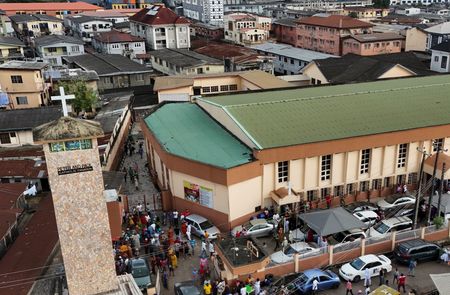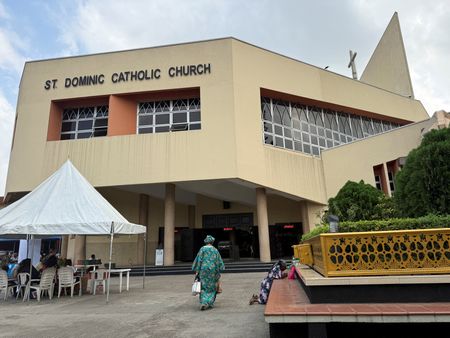By Camillus Eboh and MacDonald Dzirutwe
ABUJA (Reuters) -Nigeria said on Sunday it would welcome U.S. help in fighting Islamist insurgents as long as its territorial integrity is respected, responding to threats of military action by President Donald Trump over what he said was the ill-treatment of Christians in the West African country.
Trump said on Saturday he had asked the Defense Department to prepare for possible "fast" military action in Nigeria if Africa's most populous country fails to crack down on the killing of Christians.
"We welcome U.S. assistance as long as it recognises our territorial integrity," Daniel Bwala, an adviser to Nigerian President Bola Tinubu, told Reuters.
Bwala sought to play down tensions between the two states, despite Trump calling Nigeria a "disgraced country".
"I am sure by the time these two leaders meet and sit, there would be better outcomes in our joint resolve to fight terrorism," he said.
ISLAMIST INSURGENTS WREAK HAVOC FOR YEARS
Nigeria, a country of more than 200 million people and around 200 ethnic groups, is divided between the largely Muslim north and mostly Christian south.
Islamist insurgents such as Boko Haram and Islamic State West Africa Province have wrought havoc in the country for more than 15 years, killing thousands of people, but their attacks have been largely confined to the northeast of the country, which is majority Muslim.
While Christians have been killed, the vast majority of the victims have been Muslims, analysts say.
In central Nigeria there have been frequent clashes between mostly Muslim herders and mainly Christian farmers over access to water and pasture, while in the northwest of the country, gunmen routinely attack villages, kidnapping residents for ransom.
VIOLENCE 'DEVASTATES ENTIRE COMMUNITIES'
"Insurgent groups such as Boko Haram and Islamic State West Africa often present their campaigns as anti-Christian, but in practice their violence is indiscriminate and devastates entire communities," said Ladd Serwat, senior Africa analyst at U.S. crisis-monitoring group ACLED.
"Islamist violence is part of the complex and often overlapping conflict dynamics in the country over political power, land disputes, ethnicity, cult affiliation, and banditry," he said.
ACLED research shows that out of 1,923 attacks on civilians in Nigeria so far this year, the number of those targeting Christians because of their religion stood at 50. Serwat said recent claims circulating among some U.S. right-wing circles that as many as 100,000 Christians had been killed in Nigeria since 2009 are not supported by available data.
NIGERIA REJECTS ALLEGATIONS OF RELIGIOUS INTOLERANCE
Trump's threat of military action came a day after his administration added Nigeria back to a "Countries of Particular Concern" list of nations that the U.S. says have violated religious freedoms. Other nations on the list include China, Myanmar, North Korea, Russia and Pakistan.
Tinubu, a Muslim from southern Nigeria who is married to a Christian pastor, on Saturday pushed back against accusations of religious intolerance and defended his country's efforts to protect religious freedom.
When making key government and military appointments, Tinubu, like his predecessors, has sought to strike a balance to make sure that Muslims and Christians are represented equally. Last week, Tinubu changed the country's military leadership and appointed a Christian as the new defence chief.
In the capital Abuja, some Christians going to Sunday Mass said they would welcome a U.S. military intervention to protect their community.
STRIKES WOULD TARGET SMALL GROUPS ACROSS WIDE AREA
"I feel if Donald Trump said they want to come in, they should come in and there is nothing wrong with that," said businesswoman Juliet Sur.
Security experts said any U.S. airstrikes would most likely seek to target small groups scattered across a very large swathe of territory, a task that could be made more difficult given the U.S. withdrew its forces last year from Niger, which borders Nigeria in the north.
The militant groups move between neighbouring countries Cameroon, Chad and Niger, and the experts said the U.S. may require help from the Nigerian military and government, which Trump threatened to cut off from assistance.
(Reporting by Camillus Eboh; Writing by Silvia Aloisi and MacDonald Dzirutwe; Editing by Hugh Lawson and David Holmes)









